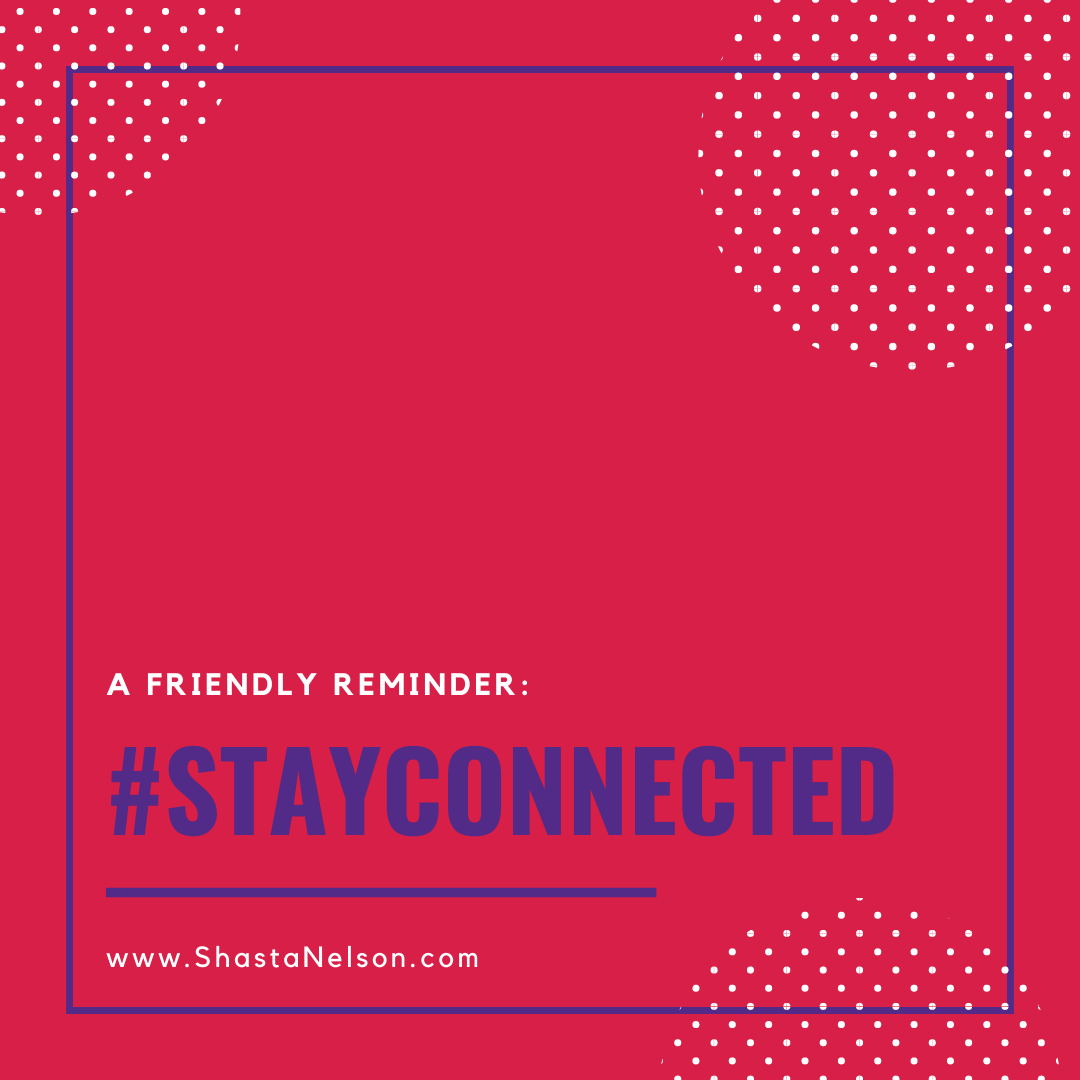That’s a headline I never thought I’d write. But today we are starting 3 weeks of “sheltering in place” here in San Francisco and even if it’s not mandated by your local government yet, more of us are opting for extreme distancing as we try to slow the spread of Coronavirus.
I am not a public health official, a nurse on the front lines, a teacher trying to engage their students in new ways, or a grocery store supplier. There’s a lot I can’t do.
But what I can do is help inspire us to #StayConnected through our isolation. So in my own small way, I plan to blog through this crisis with resources, ideas, and inspiration for more meaningful connection.
Three Truths for Transitioning Life to #StayConnected
So while you might expect me to pull out my pom-poms and encourage you to spend all day on video conferencing… for today, my advice is almost the opposite:
Being alone isn’t the same as loneliness. As we choose to #StayConnected, we also need to practice being alone a bit more. The goal of staying connected isn’t just to create a new kind of virtual busy-ness. On the contrary, we can be alone, we can be bored, and we can be quiet— those aren’t experiences to avoid. Nor are they the same as loneliness. If you’re able, use this time first-and-foremost, to connect more deeply to yourself— read books, color and paint, listen to more music, journal, turn on guided meditations, and take naps.
Preventing loneliness doesn’t just mean being on our phones and computers more. Remember that for most of us our loneliness isn’t because we’re not interacting enough, but rather because our interactions aren’t meaningful enough. In other words, in the days and weeks to come, while we might feel a need to increase our interaction; more importantly will be making our interactions more meaningful. So it has less to do with just moving our conversations to virtual land and has more to do with being mindful about how we’re really talking with each other.
Start now in small ways by making your check-in’s more meaningful. Don’t let your conversations only be about the virus and the latest news, make sure you ask about the people with whom you’re connecting.
How is this impacting your life?
What’s the scariest part for you?
Tell me more about what your days look like now…
How are your kids doing? How has this impacted your work?
Staying connected doesn’t just mean reaching out more. And, ask yourself: am I more at risk of focusing too much on myself or more at risk of focusing too much on everyone else? We’re all different on this spectrum and neither extreme is ideal.
If you’re getting caught in your head, your thoughts, and your worries— the actions that are most likely to leave you feeling connected will be reaching out to others. Even if you’re introvert, shy, or highly anxious. Who can you call? Who can you listen to a bit more? Which neighbors can you slide your cell number under their door in case they need something? What can you do that feels generous?
If you’re prone to reach out to everyone and know you’re at risk of carrying the weight of everyone else— the actions that are most likely to leave you feeling connected will be making sure you, your real thoughts and feelings, and your needs are being seen by a few people. Even if you’re in charge of tons of people and your workload just got fuller— who is one person you can call and be completely honest with? How can you share your own feelings and not just ask about theirs? What do you most need to receive right now and who can help you practice that?
I have a lot of ideas coming, but first, let’s just take a collective breath. We’re all just doing what we can to simply figure out our new temporary normal. And that’s enough for today. Stay the course, my friends: buy your food, order your medicine, put together your homeschool schedule for the kids, figure out your new work routine, sanitize the doorknobs, and deal with the ramifications and disappointments from everything that is getting canceled. Those aren’t small things.
The truth is that most of us are more likely to end this week exhausted, overworked, and peopled-out— even if we are hunkered down. Our chores and to-do lists got longer, our research skills have been maxed out, and it’s likely we’ve connected with more family and friends in one week than we’d normally talk to in a month! So, my dear friends, just be extra gentle on yourself as we collectively find our way forward.
For now, just gift yourself some alone time, if you can. Try to make the conversations you are having more meaningful. And try to find that beautiful balance between giving and receiving.
More to come… but for now: so much love to you. You are connected.

